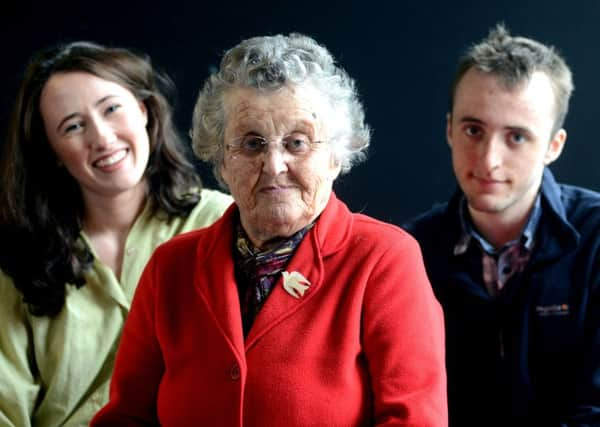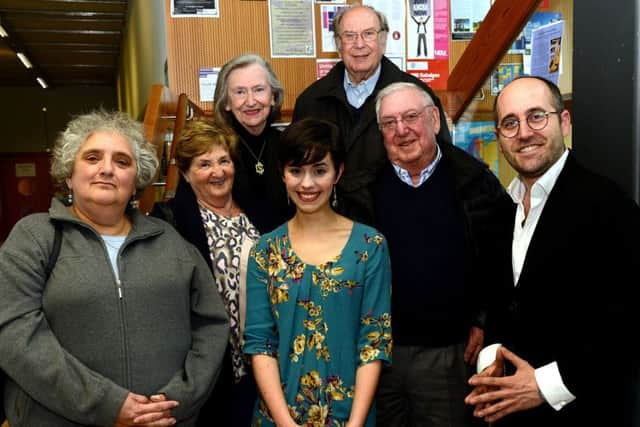Escaping the Holocaust: One Yorkshire woman's amazing story


Aged just 11 years old and speaking almost no English, in 1939 only child Susanne Ehrmann left her home city of Prague and started a journey that would take her away from the invading Nazis and to the relative safety of Yorkshire. She would never see her beloved parents again.
Now 89 and known as Sue Pearson, the retired teacher and great-grandmother has shared her amazing life story as part of an oral history project to chart the pasts of Sheffield’s Jewish population.
Advertisement
Hide AdAdvertisement
Hide AdHistory students at the University of Sheffield volunteered their time to speak to around 20 people with stories to tell, travelling to visit them in Leeds, Hull, Manchester and London as part of the project.


Sue was born in Prague in 1928 but was among the 10,000 predominantly Jewish children offered an escape route out of mainland Europe by Britain in the nine months leading up to the outbreak of the Second World War through the Kindertransport (German for ‘Children’s Transport’) scheme. Leaving behind her chemical engineer father Paul and housewife mother Else, she was among those on hastily-arranged trains out of Czechoslovakia organised by British humanitarian Nicholas Winton after the Nazis invaded in 1939. Like many of the Kindertransport children, she became the only member of her family to survive the Holocaust.
Winton managed to compile a list of 6,000 children who would face almost certain death under the Nazis and managed to get 669 of them to Britain.
Speaking to the Yorkshire Post at the official launch of the ‘Jewish Sheffield’ Witness Project, Sue said both her and her parents believed her move to England would only be temporary despite being aware of the potentially-terrifying consequences of the Nazi invasion.
Advertisement
Hide AdAdvertisement
Hide Ad“All our parents believed the whole problem would come to an end and they join us,” she said.


“As an only child, I listened to adults. I didn’t experience great difficulties myself as I was only there a short time after the invasion. But before Czechoslovakia was invaded, my mother had taken in refugees from Germany and we heard talk about what it was like to be a Jew in Germany. It was incredibly frightening.
“I thought it was going to be temporary but that changed when war was declared between Britain and Germany.”
After moving to live with a family in Sheffield, Sue then experienced the German blitz on the city that took place in December 1940, targeting the city’s factories and resulting in the deaths of more than 600 people and leaving 40,000 homeless.
Advertisement
Hide AdAdvertisement
Hide AdAged 17 when the war came to an end in 1945, as the Allied forces moved into previously-occupied German territory, horrifying stories about the extent of the Holocaust began to emerge and Sue had to confront the likelihood that her parents were among those killed.
She eventually received a letter from her father written that he had left with an acquaintance.
“They were taken to Poland in 1941, my father left a letter for me with somebody he worked with, a non-Jewish person. I received it after the war and I realised it was unlikely they had survived. My father had some English and was a very intelligent man, they had an address for me in Sheffield. He would have done his upmost to be in touch.
“I have never found out the details of what happened despite trying but they were in the Lodz ghetto in Poland.
Advertisement
Hide AdAdvertisement
Hide Ad“For me when the war ended, I didn’t quite share the joy of other people. As the stories broke through about the Holocaust, I knew it was unlikely they had survived. It was horrendous. If I had anybody to have gone back to, I would have gone back but there didn’t seem to be anybody. All I had was this letter.”
Sue married local Sheffield lad Harry Pearson a year later and the pair both went on to become teachers. They were married for 70 years up to Harry’s death last year and had three children, seven grandchildren and five great-grandchildren.
Sue says she does think about whether her own family would be here if it wasn’t for the Kindertransport and says her own experiences leave her particularly dismayed about the Government’s current treatment of child refugees from Syria.
Another Kindertransport survivor from Prague, former MP Alfred Dubs, helped to successfully campaign for the Government to commit to taking 3,000 unaccompanied refugee children, but in February this year, the Government said only 350 would be let in. Last month, it was announced there would be capacity for a further 130 children to arrive.
Advertisement
Hide AdAdvertisement
Hide Ad“I think about the children from Syria whose parents are sending them now,” Sue says.
“In 1938/39, when the country was a lot poorer they took in 10,000. Now they are quibbling over a few hundred.”
She says she is concerned about hardening attitudes towards refugees across the world. “I don’t exactly see echoes of the past but I think the media makes people feel or think that others are better off than they are and that they are better than others. It seems to thrive on those attitudes. Germany was in a very bad state before Hitler came to power and that is what he played on.
“If you are told enough times ‘That lot is bad’ and they are responsible for any bad experiences that you are having, it tells.”
Advertisement
Hide AdAdvertisement
Hide AdSue took part in the university project for similar reasons she speaks to schoolchildren about her experiences. “It is important for people to understand and respect each other’s differences. When I do talk to schoolchildren and students that is my main thing I try to put forward - that differences can be a positive thing, we can learn from each other.”
She shared her story with university students Olivia Rawbone and Edward Williamson, with a recording of it now posted online as part of the project.
Shirley Myerson, from Leeds, also shared her experiences of the war years with students and the time she spent in Sheffield with her grandparents, who ran a grocery shop in the city.
In her interview, she remembered the effect of the Sheffield Blitz, with the synagogue her parents had got married in being among the buildings that were bombed and much of the city centre badly damaged.
Advertisement
Hide AdAdvertisement
Hide Ad“The water supply ran out and they had to stand and watch the shops burn down. My mother got permission to go [to Sheffield] and came back in absolute tears. Her school and everything had gone.”
Another person to share her story with students was Sonia Howard, a 59-year-old born-and-bred Sheffielder who works for the Football Unites, Racism Divides organisation.
She said that in her childhood, Sheffield had a larger Jewish population with overflow services needed on occasion at the synagogue. She lived in America between 1985 and 1999 and says things had changed when she returned, with smaller numbers of Jewish people living in the city.
Sonia said she took part in the project not only because she feels proud of both being a Sheffield and being Jewish, but also because of her commitment to tackling prejudice.
Advertisement
Hide AdAdvertisement
Hide Ad“I can only speak for my own experience but I had a very hard time at school with anti-Semitism. Unfortunately, due to prejudice and bigotry, it will always be there. I’m lucky to work with several Muslim colleagues and I have learnt a lot from them, more about what we have in common that what is different. I want to teach people and break down barriers. It makes for a better world.”
Students grateful for meetings
Students who volunteered to take part in the project say they learnt a great deal from the experience.
Sarah Dewhirst, a second-year history student who is originally from the Bradford area, interviewed Sonia Howard and Shirley Myerson.
“I really enjoyed it, it makes you think maybe we should be asking our own grandparents questions, people do have stories to tell.”
Advertisement
Hide AdAdvertisement
Hide AdThe University of Sheffield Witness Project has been running since 2011 and has previously focused on subjects such as the city during World War II, the Miners’ Strike and the impact of deindustralisation.
Dr Daniel Lee, who helped lead the project for the university, said the interviews conducted by the students will help historians around the country.